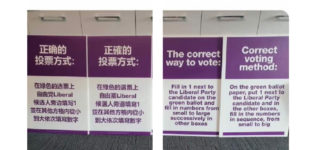Liberal Party Members Keep Their Seats, Despite Misleading Voters

Image: Liberal party voting boards translated into English.
A Federal Court has declared that Josh Frydenberg and Gladys Liu can keep their seats after a challenge over the legality of their election signage, but the court has suggested there may still be a case to answer for.
When voters turned up at voting booths in the electorates of Kooyong (represented by Mr Frydenberg) and Chisholm (represented by Gladys Liu) in May 2019, they were greeted by signage in Chinese Language.
The story so far
Both electorates have a high percentage of Mandarin-speaking voters and the signs told these voters that the ‘correct’ way to vote was to put 1 by the Liberal candidate’s name’. The signs were not the colours of the Liberal Party, but similar colours to the official Australian Electoral Commission (AEC) – purple and white.
Some months later, a legal challenge was mounted by failed candidate Oliver Yates, who ran against Mr Frydenberg, and climate campaigner Vanessa Garbett who alleged that the posters, authorised by the Liberal Party were likely to mislead or deceive voters.
Mr Frydenberg’s electorate win was convincing, but Ms Lui’s was by a relatively small margin. Nevertheless, she created history as the first elected Chinese-born member of the House of Representatives.
Since her election she has faced a number of scandals including questions over possible links to the Chinese Government’s covert propaganda operations. She has raised more than a million dollars for the Liberal Party, but has had to answer questions about that too, and in September last year was forced to cancel a $750-a-head party fundraiser which promoted her as the “celebrity auctioneer” because it was against Parliamentary rules.
The Federal Court Ruling
The Federal Court has now ruled that while the election result was not influenced by Chinese-language signs and therefore Mr Frydenberg and Ms Liu can keep their seats, it has accepted that Liberal Party acting state director Simon Frost authorised the corflutes.
It has asked Mr Frost to explain why he should not be referred to the High Court for the committal of an illegal practice under the Commonwealth Electoral Act 1918. He has until early February to respond.
In its judgement, the court said: “The AEC occupies an independent place and role under the Act of some importance, and that this independence should not appropriated or undermined by trickery or misleading or deceptive material whereby the AEC is, in effect, impersonated.”
It found that even though Mr Frost “did not have knowledge of the translation of the final version of the corflute … he had full knowledge of the essence of the misrepresentation that the corflute appeared to be a sign of the AEC”.
Lack of political integrity
Prime Minister Scott Morrison has declared the case a ‘smear job’, but it highlights again the lack of political integrity surrounding the 2019 Federal election, including fake stories being circulated on social media.
After receiving more than 500 complaints, the AEC found 87 cases of unlawful political advertising, including those about the Chinese-language signage and string of other fake claims that were widely circulated including that the Labor Party planned to introduced a death tax and a car tax.
Under the Electoral Act, the AEC has the power to take individuals to court to seek an injunction for breaches of electoral laws, and it also has the power to seek civil penalties, although it prefers instead to issue direct warnings.
It does however, vigorously pursue anyone who does not vote without a valid excuse. Not voting is an offence under the Commonwealth Electoral Act, which carries hefty fines.







